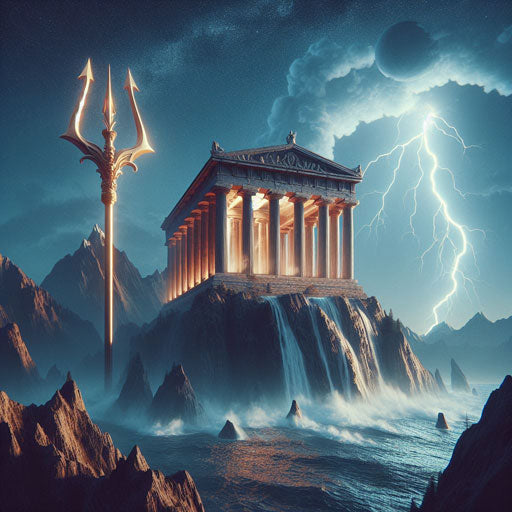Exploring the Twelve Olympian Gods
Exploring the Twelve Olympian Gods: Mythology's Most Prominent Pantheon
Introduction:
In the vast tapestry of Greek mythology, perhaps no other pantheon is as revered and iconic as the Twelve Olympian Gods. These powerful deities, residing atop Mount Olympus, are central figures in countless tales of heroism, love, betrayal, and divine intervention. Let's embark on a journey through the pantheon of the Olympian Gods, exploring their origins, domains, and enduring influence on ancient Greek culture.
Section List:
- Zeus - King of the Gods
- Hera - Queen of the Gods
- Poseidon - God of the Sea
- Demeter - Goddess of Agriculture
- Athena - Goddess of Wisdom and Warfare
- Apollo - God of the Sun, Music, and Prophecy
- Artemis - Goddess of the Hunt and Wilderness
- Ares - God of War
- Aphrodite - Goddess of Love and Beauty
- Hephaestus - God of Fire and Forge
- Hermes - Messenger of the Gods
- Dionysus - God of Wine and Revelry
1. Zeus - King of the Gods :
At the helm of the Olympian Gods sits Zeus, the thunderbolt-wielding ruler of the heavens. The thunderbolt is his primary symbol, representing his authority over the sky, thunder, lightning, and justice.

Find out more about god Zeus - click now
2. Hera - Queen of the Gods:
Hera, Zeus's consort and sister, holds the esteemed position of Queen of the Gods. She is often associated with the peacock, which symbolizes her regal nature, as well as its association with immortality and protection.

3. Poseidon - God of the Sea:
Poseidon, brother to Zeus and Hades, commands the vast oceans and seas as the god of the sea, earthquakes, and horses. His symbol is the trident, a three-pronged spear, which he wields to control the waters and create storms or calm seas.

Find out more about god Poseidon - click now
4. Demeter - Goddess of Agriculture:
Demeter is the nurturing goddess of agriculture, fertility, and the harvest. Her symbol is the sheaf of wheat, representing abundance, sustenance, and the cycles of life and death.

5. Athena - Goddess of Wisdom and Warfare:
Athena, the wise and strategic goddess, embodies both intellect and martial prowess. Her symbol is the owl, a creature associated with wisdom, foresight, and knowledge.

Find out more about goddess Athena - click now
6. Apollo - God of the Sun, Music, and Prophecy:
Apollo, the radiant god of the sun, music, healing, and prophecy, is often depicted with his lyre. The lyre, a stringed musical instrument, symbolizes artistic inspiration, harmony, and divine knowledge.

Find out more about god Apollo - click now
7. Artemis - Goddess of the Hunt and Wilderness:
Artemis, the fierce and independent goddess of the hunt, wilderness, and childbirth, is often portrayed with her bow and arrows. These symbols represent her connection to the natural world, her role as a protector of wildlife, and her ability to bring swift and sudden death to her enemies.

8. Ares - God of War :
Ares, the volatile god of war, embodies the brutal and chaotic aspects of battle. His symbols include the spear and helmet, representing his martial prowess, aggression, and the destructive force of war.

Find out more about god Ares - click now
9. Aphrodite - Goddess of Love and Beauty:
Aphrodite, the alluring goddess of love, beauty, and desire, is often associated with the dove. The dove symbolizes love, beauty, and fertility, reflecting Aphrodite's role in fostering romantic relationships, harmony, and the pleasures of physical attraction.

Find out more about goddess Aphrodite - click now
10. Hephaestus - God of Fire and Forge:
Hephaestus, the skilled craftsman and blacksmith of the gods, is the master of fire and the forge. His symbol is the anvil, representing craftsmanship, industry, and the forging of divine weaponry and artifacts.

11. Hermes - Messenger of the Gods:
Hermes, the quick-witted messenger of the gods, is known for his agility, cunning, and eloquence. His symbol is the caduceus, a staff entwined with two serpents, which represents commerce, communication, and the exchange of knowledge and information.

12. Dionysus - God of Wine and Revelry:
Dionysus, the jovial god of wine, fertility, and revelry, inspires ecstasy, madness, and liberation through his bacchanalian festivities. His symbol is the grapevine, representing the cultivation of wine and the pleasures of intoxication celebrated in his honor.

Conclusion:
The Twelve Olympian Gods stand as enduring symbols of power, wisdom, beauty, and passion in Greek mythology. Their timeless tales continue to captivate our imaginations, offering insight into the complexities of the human experience and the divine realms beyond.
From the thunderous throne of Zeus to the serene domain of Aphrodite, each deity brings a unique perspective to the pantheon, enriching the tapestry of Greek mythology with their presence and influence. As we delve into their stories and exploits, let us marvel at the enduring legacy of the Twelve Olympian Gods and the timeless wisdom they impart.

